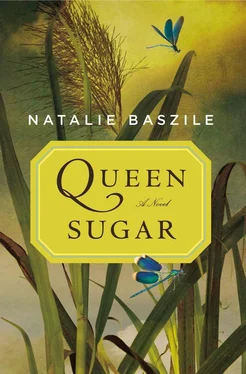“That’s sweet of you,” Charley said, noticing now that Hollywood’s hair was recently cut. “I’m flattered, but—”
Ralph Angel groaned and stood up. “Aw, Jesus, Peanut. You can do better than that. If you’re gonna ask a woman on a date, you need to be more confident. You gotta look her in the eye. Here, let me show you.” He slid between Hollywood and Charley. “Let’s start again, sis. From the top.”
“Ralph Angel.” Miss Honey sat forward in her recliner. “Let the man be. If he wants to ask Charley out, let him do it his way.”
“Relax, ’Da.” Ralph Angel turned to Hollywood. “How much is a burger and fries? Three, four dollars? Only costs you an hour’s work. You hear that, Charley? You’re worth a whole lawn.”
“You should stop,” said Charley. And maybe it was because something in Ralph Angel’s smile reminded Charley of Baron and Landry, but she decided she’d had enough. “You’re being cruel.”
Ralph Angel stepped back, his arms folded. “Well, look who’s decided to take the moral high ground.”
“What are you talking about?”
Ralph Angel looked at Charley for a long time. “Never mind, sis. Forget about it. But just so we’re square, I’m not the only one who’s being cruel.”
What could go wrong? After twelve straight days of thunderstorms, Charley believed she knew. Each day she woke up and checked the weather report, and each day the meteorologist forecast more rain; not the occasional showers that were a welcomed part of summer in south Louisiana, but a steady downpour, unrelenting, with thunder like cannon fire, lightning strikes that made you wince and duck your head, and flooding that felt biblical. Now Charley stood in the shop door, staring out at rain falling so heavily she couldn’t even see her fields across the road. Just yesterday, she sat in her car in the Winn-Dixie parking lot for twenty-five minutes, waiting for the storm to pass, then got frustrated, took off her shoes, and dashed the few yards to the entrance, only to be soaked to the bone by the time she burst through the automatic doors. What could go wrong? If she were superstitious, she would almost start to believe she’d brought this on herself.
“I can’t take much more of this,” Charley said, turning to Denton, who was busy soldering the plug on the generator. “Is this much rain normal ?”
“Just be thankful we finished laying-by when we did,” Denton said, matter-of-factly. “We were trying to finish that work now, we’d be up to our ears in mud if we could get out there at all.”
And so, Charley waited.
While it rained.
And rained.
And rained.
In New Orleans, streets flooded and power lines went down. The state closed the highway for a time.
And then, as if it were tired of playing the practical joke, the sun appeared, just for a few hours the first day, shooting rays of weak light through breaks in the clouds before the rain started again, but then growing gradually stronger, so that by the second week in July, it was a bright yellow ball. In her little corner of the world, Charley rejoiced. She was sick of being cooped up in the shop, shuffling papers or playing Monopoly at home with Micah; sick of waking to rain and going to sleep to rain; sick of feeling damp as a cotton sock.
“I’m glad that’s over.”
“Don’t get too excited,” Denton said. They were driving along the far edge of the farm, checking to see how the drains had held up. “All that rain means we’re likely to get more insects. Cross your fingers we don’t have borers.”
“Borers?” Charley said. The last time she heard Denton mention borers, he was pouring her a glass of lemonade.
“Little worms that burrow into the cane stalk,” Denton said. “If they get into the heart of the cane, you lose the sucrose; you lose the sucrose, you lose your sugar content. Basically, your crop is worthless.”
Charley sighed. “How do we know if we have them?”
“You have to pull down the cane sheath. That’s where the parent lays the eggs. If the eggs have already hatched, you’ll see holes in the cane.”
“Let’s get started. What do we need? Gloves? A flashlight?”
“I already sent someone out to check,” Denton said. “Matt Thibodeaux teaches science over at the high school, moonlights as a crop consultant. He’ll walk the fields, then write up a report. Turns out we’ve got an infestation, he’ll draw up a site map and figure out exactly how much we need to spray.”
“Sounds expensive,” Charley said. “Who’ll do the spraying and how much will it cost?”
“Bug work normally costs six dollars thirty-five an acre. But I told him we’re on a budget. Best news is, his brother’s a crop duster.”
• • •
Thibodeaux’s Flying Service was located in a low metal building beside the landing strip. When Charley and Denton arrived, Bradley Thibodeaux was sitting in a cushiony black office chair fit for a Wall Street executive, behind a big oak desk cluttered with maps and aerial photographs similar to the ones Charley had studied all those months ago. He was talking on the telephone, and at the sight of Charley and Denton, he waved them in and placed a hand over the receiver.
“Y’all make yourselves comfortable,” he whispered.
Denton motioned for Charley to take the empty seat by the desk. Another folding chair leaned against the wall, and he brought it over, sat down.
While she waited, Charley surveyed the office. The décor was spare and functional: linoleum floors, plastic blinds in the windows, a couple card tables and a watercooler in the corner — which lent to the industrial feel. The only object of interest, aside from the maps Scotch-taped to the walls, was a large gilt frame behind Bradley’s desk in which hung a portrait, done in heavy oil brushstrokes, of a man in a blue suit.
Bradley hung up the phone. “I’m sorry about that, y’all,” he said in a heavy Cajun accent. “I didn’t mean to be rude.”
He rose from his chair. “Prosper Denton. Well, hello, stranger,” walked around the desk, and shook Denton’s hand. “I wouldn’t believe this if I weren’t standing here looking with my own two eyes. How are you? It’s been what, three years?”
“About that,” Denton said.
“What’cha been up to?”
“Let me introduce you to Miss Charley Bordelon, from California.”
Bradley shook Charley’s hand and held on to it as he stood back to appraise her. “You look like you just got out of high school. What’cha doing with this old man?”
“I’m helping Miss Bordelon run her operation,” Denton said, steering the conversation back to business. “After all that rain we just got, I figured I’d have Matt come out and check for borers. He said the report was ready.”
Bradley nodded. “Just came in.” He sifted through the stack until he found Charley’s, then slipped the rubber band from a piece of rolled paper the size of an architectural blueprint, spread it over the desk, and pulled out a pair of reading glasses. “Let’s see what we got,” Bradley said, studying the field map like a three-star general planning his next attack. The map of Charley’s farm was overlaid with a grid. Each one-inch square represented a section of a quadrant, half of which were highlighted in yellow marker. “Well, you definitely got you some borers,” he said. “Everywhere it’s yellow is infested.”
Charley sighed.
“But don’t worry,” said Bradley, rolling up the map, sliding the rubber band down around it. “We’ll hit ’em with a good dose of Intrepid. That’ll stop ’em in their tracks. I’ll write up the ticket today and get on it first thing tomorrow.”
Читать дальше












